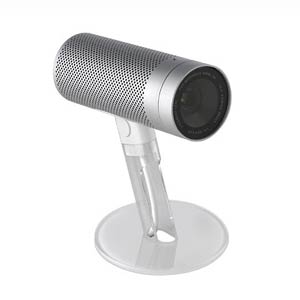I want to release the new version of the chat program I’m working on, but the Windows build isn’t working. I currently have three open bug reports on file against the Windows compiler…it’s all compiler bugstuff. Grr.
Daily Archives: January 30, 2004
Things I Want
I really, really, really want an iSight camera for my computer.

No, not for any real, legitimate, pressing reason; I just want one. I’d probably only use it to make pr0n, which I would no doubt inflict on LiveJournal readers and on whatever poor sap was unwise enough to help me get one. And what’d be the point of that?
Banned Books
Some thoughts about language
These are some random musings that came out of a conversation with Shelly this morning, and out of a conversation on a mailing list I read.
Language is a tricky thing. We use language to express our concepts and worldview, both to ourselves and to each other, yet many people have a fuzzy grasp on language, and use language in ways that are not terribly effective. As a result, people may often fault language in situations where it’s the use of language, not the language itself, that’s the problem.You’ll see this in the way people use language to describe themselves. Example: I’ve heard people say things like “I don’t call myself ‘bisexual,’ because people think that bisexuals will sleep with anyone, and I won’t sleep with anyone. So labels are wrong, and I don’t use labels to describe myself.”
Well, no, that idea puts the cart before the horse. The problem is not “labels are bad;” the problem is that people use labels in inaccurate ways. The term “bisexual” is neutral with respect to the number of sexual partners a person has, or how selective that person is about sexual partners. The term “bisexual” has a very specific meaning–a meaning which has nothing whatsoever to do with that person’s political identity, partnership strategies, or promiscuity.
People use the word “bisexual” in a fuzzy and distorted way; they say “bisexual” when they mean “promiscuous,” and this fuzziness distorts their perceptions of people who are, in fact, bisexual. But that doesn’t mean nobody should self-identify as “bisexual;” it simply means that people should learn to use language clearly and accurately.
Words have meanings. We express oursieves in language; fuzzy language leads to fuzzy expression.
Rather than say “I don’t use labels,” which is both silly and impossible–labels are nothing more than the language we use to describe ourselves, and without labels we can not describe ourselves–the better approach, I think, is to examine the labels, and see how well they work once the fuzziness is removed and they are applied with precision. A bisexual person is a person who is sexually attracted to or sexually involved with persons of both physical sexes. It does not mean “promiscuous,” but when you say “I don’t use the word “bisexual” because I’m not promiscuous, you have not only deprived yourself of a tool to describe yourself, you’ve accepted the fuzzy, distorted, and inaccurate language of others.
Labels, when properly applied, are descriptive, not conscripted; and they are precise, not fuzzy. A label describes who you are; it does not define who you are.
If a prson is attracted to members of both sexes, then it might be reasonable for that person to say “I am bisexual;” where it becomes unreasonable is when someone says “I am bisexual; bisexuals wear Birkenstocks and vote Deomcrat; therefore, I should wear Birkenstocks and vote Democrat.” Labels are descriptive language; descriptive language *describes.* You don’t change yourself to fit the label; you use labels that fit yourself.
The conscriptive use of language is often particularly evident in the poly community. Labels like “primary” and “secondary” are especially prone to this sort of abuse; people will say “I want a secondary relationship. Let’s see, a secondary relationship looks like this; therefore, I will seek to make my relationship look like this.” Just as there’s a vast chasm between saying “I am bisexual because I feel this” and “I feel this because that’s how bisexuals feel,” there’s a vast gulf between “My relationship is secondary because it looks like this,” and “my relationship looks like this because that’s how secondary relationships look.” There is nothing wrong with labels and there is nothing wrong with descriptive language, as long as the language fits the reality, rather than the reality fitting the language.
As an afterthought, from Shelly: Labels still have descriptive value even in those situations where people’s use of the labels is not 100% accurate. If you say “I don’t call myself ‘bisexual’ because peoplemight believe something that’s not true about me, like I’m promiscuous,” you neglect the fact that if you don’t call yourself ‘bisexual,’ people will definitely believe something that’s not true about you.
